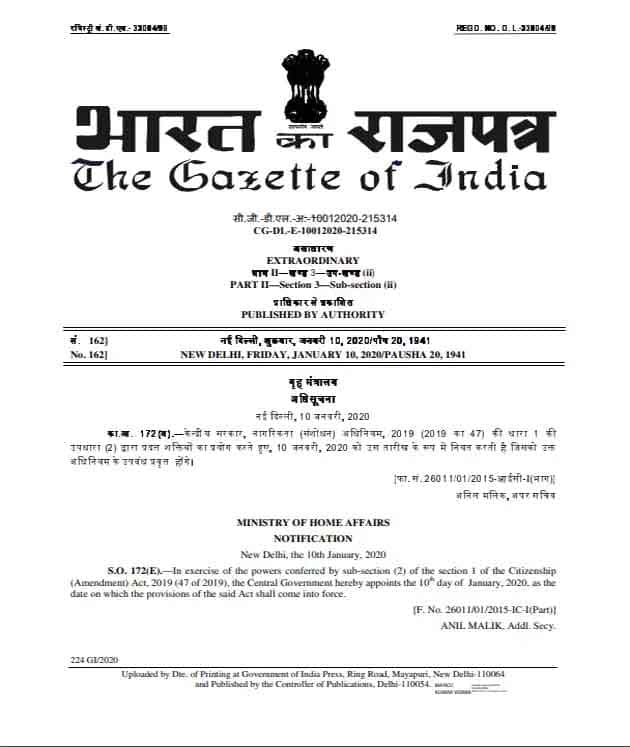Citizenship Amendment Act 2019 comes into force as Home Ministry notifies gazette
The Act allows Hindu, Christian, Sikh, Buddhist, Jain and Parsi immigrants from Afghanistan, Bangladesh and Pakistan, who faced religious persecution, and came to India before December 31, 2014, to get citizenship in India
New Delhi: The Ministry of Home Affairs (MHA) on Friday notified through the Gazette of India that the Citizenship (Amendment) Act 2019 will come into force from January 10 onward.
The Gazette, available on the Ministry's website, reads: "In exercise of the powers conferred by sub-section (2) of section 1 of the Citizenship (Amendment) Act, 2019 (47 of 2019), the Central Government hereby appoints the 10th day of January 2020, as the date on which the provisions of the said Act shall come into force."

The Act allows Hindu, Christian, Sikh, Buddhist, Jain and Parsi immigrants from Afghanistan, Bangladesh and Pakistan, who faced religious persecution, and came to India before December 31, 2014, to get citizenship in India.
The notification comes amid nationwide protests against the Act as well as concerns over the implementation of a pan-India NRC (National Register of Citizens). National capital Delhi and states like Uttar Pradesh, West Bengal, Maharashtra and Assam observed massive protests against the citizenship act. Agitators also vandalised public properties during the anti-CAA protest, which led to the imposition of Section 144 and internet suspension in these states.
Students from several universities including Jamia Milia Islamia, Aligarh Muslim University, JNU and Kolkata and Jadavpur University raised their voice on the issue and slammed the government over the move of implementation of CAA in the country calling it to be a move against secularism in the country.
Known as CAA, the law evoked protest at various cities across the country since the Parliament passed it, leading to injuries to hundreds of security personnel, the strongest dissent against Prime Minister Narendra Modi since he came into power in 2014. Over 2,000 people have been arrested and around 5,000 detained while protesting against the CAA.
Clearing misconception fuelled by the opposition regarding the CAA, the government has, on many occasions, clarified that the law "absolutely nothing to do with citizens of India" as the rumour was raised that it is against Muslim community and the people belonging to the community residing illegally will be deported.
"It has nothing to do with the deportation of any foreigner from India," the government has said. "The deportation process of any foreigners irrespective of his religion or country is implemented as per the mandate of the Foreigners Act, 1946 or The Passport (Entry into India) Act, 1920."
The CAA has absolutely nothing to do with any Indian citizens in any way, the government has stressed.
Union Home Minister Amit Shah who tabled The Citizenship (Amendment) Bill, 2019, in the Rajya Sabha on December 11, assured that the Muslims in India don’t need to fear about the Act. The ruling Bharatiya Janta Party launched several campaigns to educate people on the matter.
The Citizenship Amendment Bill became an Act after receiving President Ram Nath Kovind's approval on December 13, 2019.
Stay informed on all the latest news, real-time breaking news updates, and follow all the important headlines in india news and world News on Zee News.
)
